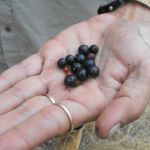Australian Tropical Herbarium (ATH)
James Cook University, Commonwealth Scientific and Industrial Research Organisation (CSIRO), Queensland Government
The Australian Tropical Herbarium (CNS) is a joint venture of the CSIRO, Australian and Queensland Governments and James Cook University. It boasts state of the art facilities and infrastructure for specimen processing and curation, photography, pest and climate control, and field, herbarium and laboratory research. Research at the Herbarium covers a range of topics including tropical plant and fungal taxonomy and evolution, ethnobotany, ecology, climate change studies, development of identification tools, and regional ecosystem mapping.
The ATH collection has a fully databased and representative archive of preserved plant specimens that supports the Herbarium’s research and botanical information delivery programmes. It is comprised of 161,363 specimens that are pressed, dried and mounted on herbarium sheets held in the Collection Room, 17,776 specimens that are preserved in 70% ethanol held in the Spirit Room, and 2,500 wood blocks.
- Website
- https://www.ath.org.au/
- Organisation type
- University Research Centre
- Queensland Government – Partner
- Joint Venture of James Cook University, Queensland Government, and Australian Government
- Number of research staff
- Up to 20 research staff
- Address
- Sir Robert Norman Building (E2), James Cook University, McGregor Road, Smithfield, Cairns QLD 4878
Strengths and capabilities
- taxonomy and systematics of plants and fungi
- vegetation and regional ecosystem mapping
- traditional uses of tropical plants and fungi (ethnobotany)
- plant conservation science
- plant and fungal genetics and genomics
- assessing and mapping biodiversity
- developing plant identification tools
Facilities and major equipment
- herbarium collection
- plant genetics and molecular laboratories
- field research and survey vehicles and equiment
- research shadehouse
- vouchered DNA collection
Lead researchers
Mr Gerry Turpin—Deadly Award Winner 2014 - Indigenous Scientist of the Year
Key science sectors
More information about the sectors this centre is involved in:
Update details
Is this your centre? See any issues? Send a request to update your listing.
